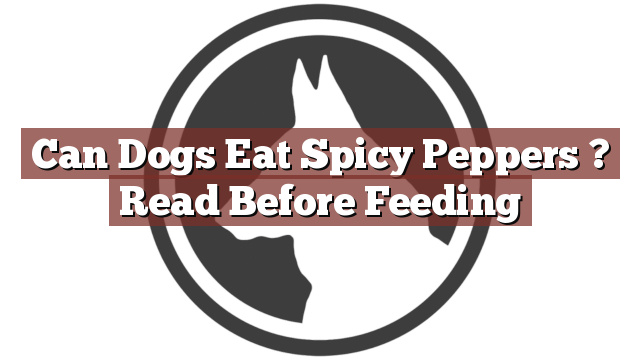Understanding Your Dog’s Dietary Needs
As a responsible pet owner, it is crucial to understand your dog’s dietary needs to ensure their health and well-being. Dogs are primarily carnivorous animals, and their diet should consist mainly of high-quality protein sources. However, some fruits and vegetables can also be included in their meals to provide additional nutrients. While it is beneficial to offer a variety of foods to your furry friend, it is essential to be cautious about certain types of foods, especially when it comes to spicy peppers.
Can Dogs Eat Spicy Peppers? Read Before Feeding
Can dogs eat spicy peppers? It is important to note that no, dogs should not eat spicy peppers. Spicy peppers, such as jalapenos, habaneros, or chili peppers, contain a compound called capsaicin, which gives them their heat. This compound can cause adverse reactions in dogs, leading to various health problems. Dogs have a different digestive system than humans and are more sensitive to certain foods, particularly spicy ones. Feeding spicy peppers to your dog can result in digestive issues, stomach upset, vomiting, diarrhea, or even more severe complications.
Pros and Cons of Feeding Spicy Peppers to Dogs
While spicy peppers are known to provide some health benefits for humans, such as boosting metabolism and reducing inflammation, these advantages do not necessarily apply to dogs. In fact, the risks and cons of feeding spicy peppers to dogs outweigh any potential benefits. The capsaicin in spicy peppers can irritate a dog’s digestive system, leading to discomfort and gastrointestinal distress. Additionally, dogs are not accustomed to the intense heat of spicy peppers, and consuming them can cause a burning sensation, potentially leading to an aversion to certain foods or even refusal to eat altogether.
It is also worth noting that some dogs may be more sensitive to spicy foods than others. Breeds with delicate or sensitive stomachs, such as Bulldogs or Pugs, should be especially kept away from spicy peppers. Additionally, if your dog has any pre-existing digestive issues or medical conditions, it is crucial to consult with a veterinarian before introducing any new food into their diet.
Conclusion: Considerations for Feeding Spicy Peppers to Your Dog
In conclusion, it is best to avoid feeding spicy peppers to your dog. While you may enjoy the fiery flavor and health benefits of these peppers, they can have adverse effects on your furry friend’s digestive system. It is essential to prioritize your dog’s well-being by sticking to a balanced and appropriate diet specifically formulated for their nutritional needs. If you are looking to offer variety in your dog’s diet, consult with a veterinarian to identify safe and appropriate options that will contribute to their overall health and happiness. Remember, when it comes to feeding your dog, their health and safety should always be the top priority.
Thank you for taking the time to read through our exploration of [page_title]. As every dog lover knows, our furry friends have unique dietary needs and responses, often varying from one canine to another. This is why it's paramount to approach any changes in their diet with caution and knowledge.
Before introducing any new treats or making alterations to your dog's diet based on our insights, it's crucial to consult with a veterinarian about [page_title]. Their expertise ensures that the choices you make are well-suited to your particular pet's health and well-being.
Even seemingly harmless foods can sometimes lead to allergic reactions or digestive issues, which is why monitoring your dog after introducing any new food item is essential.
The content provided here on [page_title] is crafted with care, thorough research, and a genuine love for dogs. Nevertheless, it serves as a general guideline and should not be considered a substitute for professional veterinary advice.
Always prioritize the expert insights of your veterinarian, and remember that the health and happiness of your furry companion come first.
May your journey with your pet continue to be filled with joy, love, and safe culinary adventures. Happy reading, and even happier snacking for your canine friend!

